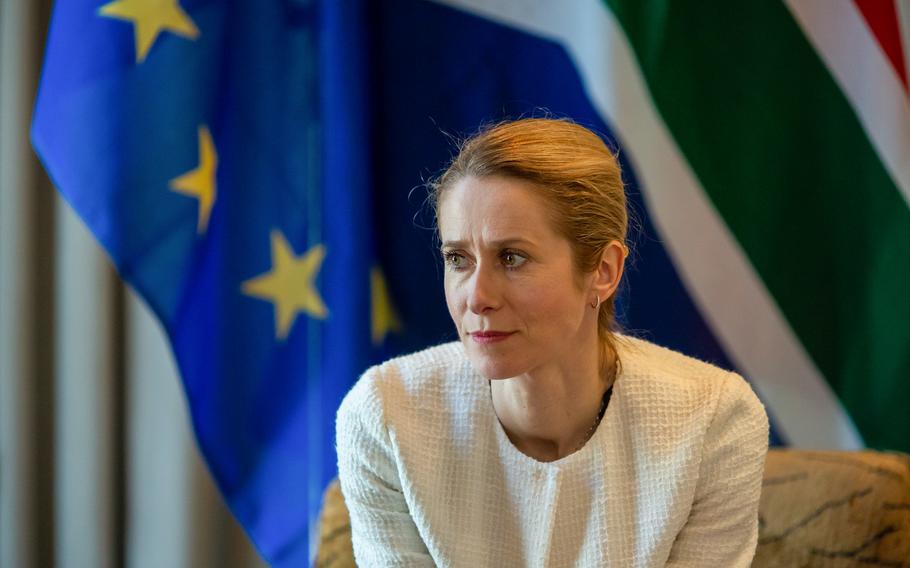
Kaja Kallas, in Cape Town. (Dwayne Senior/Bloomberg)
The European Union’s top diplomat touted joint bonds as an option to massively rebuild the bloc’s military might, while criticizing the Trump administration’s early negotiating tactics on resolving Russia’s war in Ukraine.
Kaja Kallas, speaking to Bloomberg in Cape Town, South Africa, ahead of a Group of 20 meeting, warned that the Russian narrative is gaining ground and that Europe would require a massive reallocation of resources.
Discussions have accelerated in the EU on how to increase defense spending, with topics such as joint financing increasingly becoming part of the conversation. Kallas said the bloc could also look at redirecting unused money from a Covid pandemic recovery fund.
“I think this is short-term funding where we need to really find how we can use the leverage and really act fast,” Kallas said, adding that common bonds were on the table. “But it’s also the midterm and the long-term funding that we need to look into.”
European leaders were shocked when President Donald Trump put in motion discussions with Russia aimed at ending the war with Ukraine without involvement from Kyiv or Europe. This has left officials on the continent struggling to figure out a way to influence the unfolding events and make sure an eventual deal doesn’t sacrifice the security of Europe and Ukraine.
“It requires still very painful decisions from the member states,” she said. “I think it’s an illusion if we think that we can just do this without reallocation of resources or reallocation or reprioritizing.”
Emergency meeting
French President Emmanuel Macron was planning to meet with a group of European leaders on Wednesday to continue discussions on ways to bolster Europe’s defense capacity. This follows a separate meeting he held on Monday that included German Chancellor Olaf Scholz and UK Prime Minister Keir Starmer.
Protecting Ukraine and expanding their own militaries could cost the continent’s major powers an additional $3.1 trillion over the next 10 years, according to a Bloomberg Economics analysis. NATO planners estimate the alliance will need to spend as much as 3.7% of GDP on defense, Bloomberg reported earlier.
Secretary of State Marco Rubio and other American officials met in Saudi Arabia Tuesday in the highest level face-to-face meeting with Russian counterparts since Moscow’s full-scale invasion of Ukraine in 2022. Ukraine and European allies were excluded from those talks.
Trump has sought to reset ties with Putin’s government that were ruptured over Russia’s invasion of Crimea in 2014. Relations between Washington and Moscow continued to deteriorate over a series of cyberattacks and overseas assassinations and went into deep freeze after Russia decided to invade Ukraine in 2022.
Speaking in Florida Tuesday, Trump blamed Russia’s invasion on Ukraine’s leadership under President Volodymyr Zelenskiy, saying, “you should have never started it. You could have made a deal.”
Last week, U.S. Defense Secretary Pete Hegseth told allies on Wednesday that America wouldn’t contribute troops to secure a peace, called eventual NATO membership for Ukraine unrealistic and said the government in Kyiv would probably have to accept the loss of some territory.
“They are assuring us that they are not making concessions,” Kallas said. “What we see from the media, it seems to us that many things have been already taken off the table before the negotiations have even started and I don’t think it’s a very good negotiation tactic.”
Kallas also emphasized that any deal reached without the Europeans won’t work since Europe will be central to any peace and eventual reconstruction effort.
“To kick off peace talks on Ukraine is the right move, we must give the American president that,” German Defense Minister Boris Pistorius said Wednesday in an interview with Deutschlandfunk radio. “The fact that he first wanted to do it without Ukraine is totally unacceptable. And it’s also unacceptable that he wants to negotiate without Europe but place all of the burden of securing the peace on Europeans.”
EU leaders are considering a few options to boost defense spending, such as triggering an escape clause to the EU’s fiscal rules to allow countries to boost spending without running afoul of the bloc’s regulations. They’re also weighing repurposing existing funds, including those in the pandemic recovery fund, for defense purposes, Bloomberg reported earlier.
Deutsche Bank economists estimate that the EU has about €400 billion ($419 billion) of defense funding available through national fiscal space, the bloc’s cohesion funds and from repurposing money in existing programs, such as the Recovery and Resilience Facility and the European Stability Mechanism.
Polish Prime Minister Donald Tusk told reporters after the Paris meeting Monday that he received assurances from the European Commission, the EU’s executive arm, that “many” billions of euros of outstanding European funds will be repurposed for defense, “which can be mobilized immediately.”